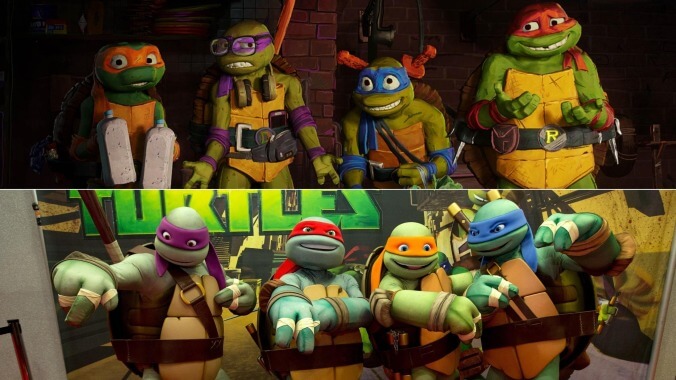Why Teenage Mutant Ninja Turtles will always be relevant
Mutant Mayhem is the latest proof that, as both characters and as a broader IP franchise, the Teenage Mutant Ninja Turtles transcend nostalgia bait

With the upcoming release of Teenage Mutant Ninja Turtles: Mutant Mayhem, there will have been seven theatrical TMNT movies, set in three (or four, depending on your count) distinct universes, and released across three decades. Across that same period, there have been four cartoon shows and a live-action show (which controversially featured a female turtle). Weirdly, though, while going for seven movies and countless TV shows approaches creative bankruptcy for other famous ’80s IP—cough Transformers cough—the Ninja Turtles has mostly managed to avoid testing everyone’s patience like that. And there’s a good reason for it: Today’s Ninja Turtles is not yesterday’s Ninja Turtles, and it’s not trying to be.
But, at the same time, it is kind of the same Ninja Turtles as always. Like The Transformers and its “Autobots wage their battles to destroy the evil forces of the Decepticons” thing, there are some constants here: Four turtles, turned into teenage mutants by some kind of ooze, learn how to be ninjas with the help of their adoptive father. Leonardo leads and has swords, Raphael has a bad attitude and sai, Michelangelo is a party dude with nunchucks, and Donatello is a brainy guy with a bo staff.
Those are the same four guys at the center of Mutant Mayhem, but the movie doesn’t seem to be putting in any particular effort to appeal to older fans of the franchise beyond the existing (and universal) appeal of turtles who are teenage mutant ninjas. (There are a number of relatively obscure TMNT side characters in the movie, but that seems to be less about fan service and more about making use of the IP.) Other than the fact that the characters are color-coded, a design choice invented by the first cartoon since the original Kevin Eastman and Peter Laird comics were black and white, the characters don’t look much like any previous incarnations, and since they’ve been aged down to act more like teenagers, they don’t really behave like most other versions of these characters.
Here’s the thing about that, though: You could say the same about the Michael Bay-produced live-action movies; you could say the same about the 2007 TMNT animated movie; you could say the same thing about the ’90s live-action movies; and you could say the same thing about all of the different cartoons over the years. There’s always a different version of the Turtles designed to appeal to a different generation of fans, and—somewhat miraculously—it usually works.
Because of that, a new Ninja Turtles thing is able to offer a nostalgic appeal for fans without being obvious nostalgia bait (because the core appeal of these four characters doesn’t change) and it can be a new thing for new fans to get into (because, again, the core appeal of these four characters doesn’t change). There have been some more obvious fan service-y Turtles things over the years, usually in the form of direct-to-video movies like Turtles Forever (where the then-current Turtles met the ’80s Turtles) and Batman Vs. Teenage Mutant Ninja Turtles, but those are notably not really the Main New Thing.
Thanks to this careful (or maybe just lucky) control of the brand, Teenage Mutant Ninja Turtles is able to sidestep the usual debate about whether an old IP like this actually “matters” to anyone anymore, because something like Star Wars has decades of baggage and something like Masters Of The Universe has never really been able to connect with a new audience beyond its original fans, but Teenage Mutant Ninja Turtles doesn’t have either problem.
Mutant Mayhem fully embodies that idea as a reboot with no connections to other Turtles stories, with quirky new designs for the main characters and a funky new art style, so you can look at it for one single second and know that—unless you’re a small child—it’s not the Ninja Turtles you grew up with and it’s not trying to be, but it does seem to have the things that people like about the Ninja Turtles (turtles, ninjas, ooze).
Better yet, it doesn’t even matter if Mutant Mayhem is a hit. It has done its job simply by being a new Ninja Turtles thing, and you can tell because Paramount is already developing a sequel to Mutant Mayhem and two seasons of a new animated series. And if none of that hits with today’s kids, then just wait a few years and someone else will come along with a “new take” on the Ninja Turtles that more or less amounts to a new art style and new personality tweaks for the main cast, all of whom will retain their names, signature weapons, and favorite color.
The Teenage Mutant Ninja Turtles will always be relevant because if it’s ever not relevant, then it will … mutate … into something new that will hopefully connect better with the core (kid) audience.